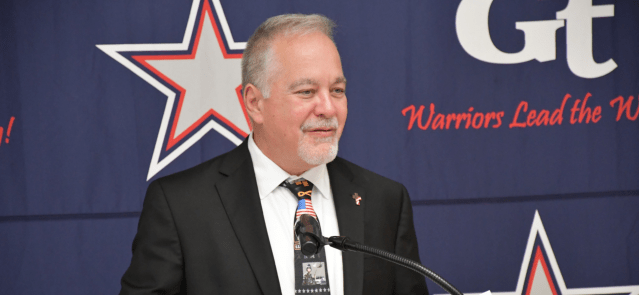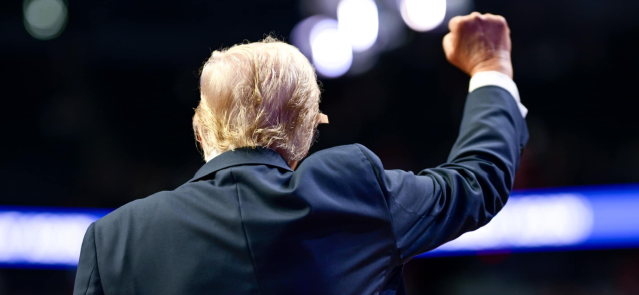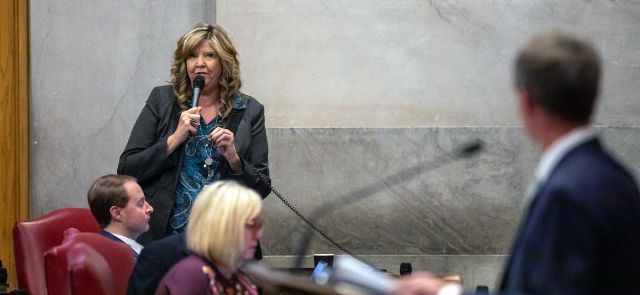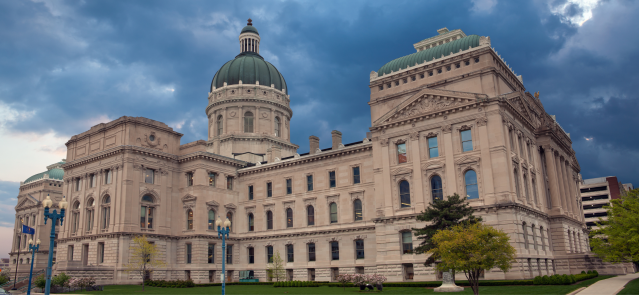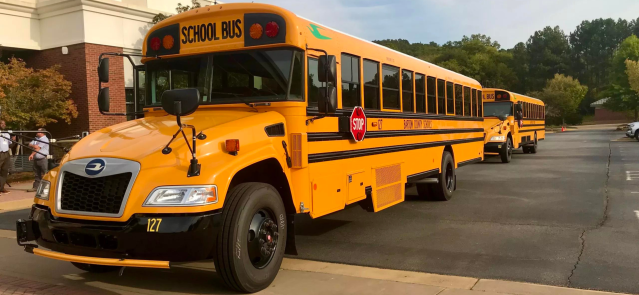INDIANAPOLIS — Our quadrennial veepstakes mystery will end Tuesday in Pennsylvania. That’s when presumptive Democratic presidential nominee Kamala Harris will kick off a swing-state tour with her new running mate.
Asked by reporters in Atlanta on Tuesday whether she had finalized her choice, Harris said, “Not yet.”
But the fact that this ticket tour begins in Philadelphia has sparked much speculation around Pennsylvania Gov. Josh Shapiro. He — along with Minnesota Gov. Tim Walz, Transportation Secretary Pete Buttigieg and U.S. Sen. Mark Kelly of Arizona — is on the so-called shortlist, though anyone with any real knowledge ain’t talkin’.
Buttigieg acknowledged in an interview Monday on Jon Stewart’s “Daily Show” that he’s “probably” being vetted.
“All I should say about it is that she’s going to make this decision,” Buttigieg said. “She’s got a process to help her make this decision.”
When Stewart pressed him on whether he’d made the “quarterfinals,” Buttigieg said, “What I know is that there’s a flying formation. What I’ll say is, no matter what the flying formation is going to be, I’m really excited to be part of this. I’m excited to be part of this campaign.”
Since President Joe Biden dropped out of the race on July 21, Secretary Buttigieg has had a ubiquitous presence across the cable news spectrum.
He will appear in Kokomo on Friday to tout the Biden administration’s job creation profile at a battery manufacturer. As he did a couple years ago, there is speculation he could attend the Indiana Democratic Editorial Association convention in French Lick later in the day. Democratic Chairman Mike Schmuhl will host an event on the veranda at 3 p.m.
Schmuhl managed Buttigieg’s 2020 presidential campaign, which raised more than $90 million. The New York Times reported that a significant part of Buttigieg’s donor network is backing him for the ticket.
The former South Bend mayor told MSNBC’s “Morning Joe” on July 26: “I think anybody would be flattered to be mentioned in that context — I certainly am. There is really not more I can or should say about that process other than she’s going to make that decision.”
He had a sensational interview on “Fox News Sunday,” which only continued to pump up his reputation as one of the Democratic Party’s best messengers.
When anchor Shannon Bream brought up the topics of immigration and crime, Buttigieg said, “The false message of the RNC was that this was leading to an increase in crime.”
Bream responded, “If people had not been in this country illegally, people would still be alive.”
Buttigieg retorted, “Of course there are individual cases, but this is my point, right, trying to make people think that crime is up when crime is down under Joe Biden and crime was up under Donald Trump. Now I don’t know how often that gets reported on this network. So if you’re watching this at home, do yourself a favor and look up the data.”
That give-and-take prompted national Republican operative and analyst Mike Murphy to call Buttigieg the Democratic Party’s top messenger who would be a ticket asset. On Monday on MSNBC, Murphy also downplayed the notion of adding a governor simply to win a swing state, saying that is a tell-tale from a bygone era.
How does Howey Politics Indiana/State Affairs handicap this?
Gov. Shapiro: The Harris ticket tour beginning in Philadelphia has national pundits swooning over Gov. Shapiro. It would be awkward for him to laud a ticket that he would not be a part of. Shapiro leads a toss-up battleground state with 19 Electoral College votes. Like Harris, he’s a former prosecutor, and a dynamic speaker who carried his state with a 15% plurality over a Donald Trump acolyte two years ago.
Sen. Kelly: He told Politico he will be in Arizona next week. Arizona is a toss-up battleground state with 11 Electoral College votes, while neighboring Nevada has six Electoral College votes (assuming Sen. Kelly has had a presence in the Las Vegas media market). His strengths to the ticket would be he would help Harris deal with the southern border controversies; his wife, Gabby Giffords, survived an assassination attempt and could help articulate gun issues; and Kelly is a former astronaut, which is seen as an asset.
Secretary Buttigieg: He would posit the ticket as a torch passing to the “next generation.” He is now a resident of toss-up battleground Michigan, where about 10% of the southwestern part of the state was in the South Bend media market. He was fully vetted when he joined the Biden cabinet. His sexual orientation has been approached by some pundits like David Axelrod as the proverbial “bridge too far,” but those citizens uncomfortable with the idea of a gay vice president probably wouldn’t vote Democrat anyway. It would be fascinating to watch Buttigieg debate Republican nominee JD Vance, who has been a font of controversial statements since he joined the GOP ticket last month. Plus, Secretary Buttigieg polls better than any of the other contenders. He’s a long shot, but this is a dynamic, game-time decision and we haven’t placed an electronic fly on the wall at Kamala HQ in Wilmington.
Gov. Walz: The Minnesota governor is credited with creating the caricature of the Republican Party as “weird.” He’s a former schoolteacher who could help keep Minnesota in the blue column while having Upper Midwest appeal that could play in neighboring toss-up battleground states of Wisconsin and Michigan.
Banks supports Vance, all the way to his nomination
The night Indiana U.S. Rep. Jim Banks addressed the Republican National Convention in Milwaukee, he was invited to sit in the VIP box with Donald Trump, Donald Trump Jr., JD Vance and Tucker Carlson.
Now, as questions swirl around the selection of Ohio U.S. Sen. JD Vance as the vice presidential nominee, look no further than that VIP box to figure out how he ended up on the ticket.
Numerous media sources have said Trump Jr., backed by Carlson and Banks, pushed for Vance on the ticket. (Carlson’s son, Buckley, is on Banks’ congressional staff.) “It’s the American dream — he’s just gonna be an incredible pick,” Trump Jr. told ABC News at the Republican National Convention.
After Vance addressed the RNC, Banks told Politico the pick of Vance was “generational,” adding, “It is a personal story for literally tens of thousands of Americans who feel like Washington has completely ignored them. I think especially after Saturday, Donald Trump is thinking a lot about the future. To me, it’s less about [the] running mate [as] it is about the future of our Republican Party, the future of the America First movement. And JD Vance is that future.”
But Vance’s rollout following the RNC has been cluttered with controversial quotes that have surfaced. It is unclear whether Vance underwent a comprehensive vetting process.
The most infamous quote was the “cat lady” remark he made on Carlson’s Fox News show in 2021 when Vance called “childless” Democratic leaders out of sync with voters. But there has been an array of similar bombshells from Vance, who called Donald Trump “America’s Hitler” and compared him to “cultural heroin.”
Others have reported that Vance suggested there should be a “federal response” to keep women from traveling out of state for abortions in a January 2022 episode of Aimee Terese’s “What’s Left” podcast.
CNN analyst Harry Enten said on X that Vance is the “least-liked non-incumbent vice presidential nominee in at least 44 years,” noting he had a double-digit unfavorable rating with voters across the Midwest. A CNN poll in July found Vance had a 28% favorable rating and a 44% unfavorable — or a -16 — rating among registered voters surveyed in Illinois, Indiana, Michigan, Ohio and Wisconsin.
“The people who know him best, the region that knows him best, they like him even less than America likes him,” Enten told the network’s Erin Burnett.
Banks has played a conspicuous role in Vance’s ascent. The two endorsed each other’s U.S. Senate campaigns, with Banks’ endorsement coming in 2022 while Vance endorsed the Columbia City Republican earlier this year. Banks told Axios in 2022 that Vance “isn’t afraid to stand up to the woke elites and will always put middle- and working-class Ohioans first.”
In his endorsement of Banks, coming after Mitch Daniels declined to run against him for the Senate, Vance said, “We need more leadership in Washington like Jim Banks. Jim puts the interests of our own country first, like working to secure our border from illegal immigration and illicit drugs and fentanyl, standing up against Big Tech censorship and fighting for America First trade policies that support working families with job creation right here at home.”
Vance’s first solo campaign stop after the convention was in Fort Wayne last week, with Banks in tow.
Banks has also forged a friendship with Trump Jr., who campaigned for the congressman and for gubernatorial candidate Mike Braun at Fischer Farms in Shelbyville in late March.
Before Vance was nominated for the Trump ticket, Banks conspicuously backed Vance. “On the day JD Vance was selected as vice president, it was Jim Banks who introduced JD Vance to the convention,” Allen County Republican Chairman Steve Shine said on WFIU-FM’s “Noon Edition” on July 26. “Not to delegates, but around Milwaukee.”
When Donald Trump decided on Vance for the ticket, The New York Times reported that one of the first outbound calls Vance made was to the younger Trump to thank him for his help, according to a person with knowledge of the call. The Times also reported that during Vance’s pre-RNC speech walkthrough, Trump Jr. accompanied the U.S. senator from Ohio onstage.
As for Banks, this episode isn’t the first time he has acted as a power broker. In the Dec. 8, 2011, edition of Howey Politics Indiana, Banks was described as part of a “restive” conservative wing of the Senate Majority Caucus who began targeting female Republican incumbents. State Sen. Bev Gard was facing a challenge from Ultimate Fighting Championship veteran Chris Lytle. Gard ultimately retired, while Mike Crider defeated Lytle and John Merlau in the Senate District 28 primary in 2012.
Sources tell Howey Politics Indiana/State Affairs that the restive conservatives — Sens. Banks, Scott Schneider, Carlin Yoder, Travis Holdman, Mike Delph, Mike Young and possibly John Waterman and Jean Leising — are banding together to push what would have been unheard of in the era of Senate President Pro Tem Bob Garton: primary challenges to sitting members. One source said it is a “movement” patterned after a similar move to the right in Congress that was championed by U.S. Sen. Jim DeMint of South Carolina during the Tea Party movement in 2010.
Their potential targets included Sen. Connie Lawson (who was eventually elevated to secretary of state) and Sue Glick, the LaGrange Republican who authored the state’s 2022 abortion restriction law passed in a July special session that year.
“A Tea Party challenge to U.S. Sen. Dick Lugar from Indiana Treasurer Richard Mourdock may have only heightened the fervor for a ‘regime change,’” Howey Politics Indiana reported in December 2011. One former legislator told Howey Politics Indiana that things had “changed immeasurably” since the past two Republican waves that brought an influx of young conservatives to the Indiana Senate. The conservatives had been traveling to Tea Party and other events across the state well outside of their Senate districts. “Brian and David have their hands full,” one source said of then-House Speaker Brian Bosma and then-Senate President David Long.
That movement didn’t gain much traction. But Banks was no worse for the wear for trying. When Banks ran for Congress in 2015, Long was among a group of Northeast GOP legislators who endorsed him.
Governor
Braun, Rainwater tax plans
Indiana gubernatorial nominees have presented dueling property tax proposals, causing the race’s focus to shift toward the practicality of their relief plans. On July 26, U.S. Sen. Mike Braun, the Republican nominee for governor, unveiled his property tax plan. Braun called for Hoosiers whose homes are valued at more than $125,000 to receive a 60% homestead deduction. Under his plan, Hoosiers with homes valued below that amount would get a 60% supplemental deduction and a $48,000 standard deduction.
In addition, Braun would cap the increase in property tax bills for seniors, “low-income” Hoosiers and families with children under 18 at 2%; all other Hoosiers’ property tax bill increases would be capped at 3%.
Donald Rainwater, the Libertarian gubernatorial nominee, said in a Monday news release that his opponent’s property tax plan displays a “desire to continue the state government’s practice of giving some Hoosiers more favorable treatment than others.” Rainwater contended Braun’s plan fails to solve the “overall issue.”
Rainwater has proposed capping property taxes at 1% of a property’s purchase price for a maximum of seven years. He says his plan would end “perpetual” property taxes.
“Every Hoosier deserves to own their personal property without the fear of the government taking it for failure to pay taxes,” Rainwater said in the release.
Read the full story by State Affairs Statehouse reporter Jarred Meeks here.
Democrats respond to Beckwith
Over the weekend, Braun’s running mate, Micah Beckwith, posted comments on X about the opening ceremony of the Olympic Games, calling its organizers “satanic” and hoping Paris would fall into a long electrical blackout.
“Micah is proving on the campaign trail that he would use the lieutenant governor’s office as a stage for endless culture wars, including focusing on events thousands of miles away from Indiana,” Indiana Democratic Party Spokesman Sam Barloga said in a statement. “His outsized influence in a Braun administration will turn Indiana’s executive branch into a vehicle that pushes divisive rhetoric, book bans, and an abortion ban with no exceptions, including for rape, incest, or the life of the mother. The contrast couldn’t be more clear. Jennifer McCormick and Terry Goodin will lead with a focus on childcare reform, workers’ rights, and restoring reproductive freedom to Hoosier families.”
Large donations
Jennifer McCormick (D): Local 157 PAC Fund, $10,000 (July 25).
Mike Braun (R): Joseph Pohrer III, $10,000 (July 25); Eric Preitauer, $22,000 (July 23).
Congress
Congressional District 1: Niemeyer seeks debates
Lake County Councilman Randy Niemeyer announced Monday that his campaign has formally reached out to local organizations and media outlets to help organize three debates with incumbent Congressman Frank Mrvan. These debates are proposed to take place in each county of the district, providing a comprehensive platform for voters to hear directly from both candidates before early voting begins Oct. 8.
Niemeyer listed as NRCC ‘Young Gun’
The National Republican Congressional Committee listed Niemeyer in the 2024 “Young Guns” program. Candidates who achieve full Young Guns status have successfully collaborated with the NRCC and completed the requirements that establish a path to victory on Election Day.
Niemeyer issued the following statement: “I am honored to be named to the NRCC Young Guns program. I am humbled by the support we have received from hardworking Hoosiers to conservative leaders across the country. There is much work to be done to flip this district and bring true leadership to Indiana’s First District. Our campaign remains focused on common-sense solutions to the issues that matter most: reducing inflation, securing our border, and keeping our neighborhoods safe. Together, we can deliver the positive change that Northwest Indiana deserves.”
Congressional District 6: Farm Bureau endorses Shreve
Indiana Farm Bureau’s federal, nonpartisan political action committee, the Indiana Farm Bureau ELECT PAC, has endorsed Jefferson Shreve.
“At the federal level, there are many legislative decisions made each year that can impact Hoosier farmers’ bottom line and how they run their operations,” said Randy Kron, president of Indiana Farm Bureau. “The Indiana Farm Bureau ELECT PAC is happy to endorse Jefferson Shreve for Indiana’s sixth congressional district because we need elected officials who are willing to listen to and advocate for Indiana agriculture and rural communities in D.C.”
Brian A. Howey is senior writer and columnist for Howey Politics Indiana/State Affairs. Find Howey on Facebook and X @hwypol.

